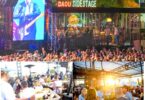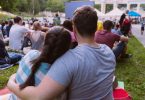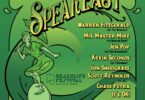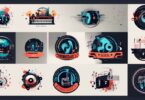Surfwise is a documentary that follows the true-life story of the Paskowitz family through decades of their life and the start of their legendary surf camp.
The father Dorian “Doc” Paskowitz sets out to realize a utopian dream. He leaves his successful medical practice, and begins the nomadic life of a surfer. However, the big twist is that he takes his wife and nine children along for the ride, all eleven of them living in a 24-foot camper. Together, they live a life that would be unfathomable to most, but enviable to anyone who ever relinquished their dreams to a straight job. The Paskowitz Family proves that America may be running out of frontiers, but it hasn’t run out of frontiersman.
The feature-length film dazzles with beautiful imagery and sharp characters. The music reminds us of the groovy beach bum past. The pacing is swift, but slows appropriately to allow characters to naturally build.
Recently, LA’s the Place had the opportunity to speak with director Doug Pray:
LA’s The Place: How did you become involved in the project?
Doug Pray: A producer [Jonathan Pine] came to me and asked, ‘have you ever heard of the Paskowitz family’? And I felt stupid because a lot of people in Southern California do know of them or have heard of them. They started one of the first surf camps in California. If you go to a surfer, over fifty percent of them know their name immediately. Hawaii too.
LATP: It flirts thematically with your past projects. Was that a conscious decision on your part?
DP: I didn’t want to do another sub-culture film. I don’t want to be that guy. I was introduced to Jonathan [Paskowitz]. He started telling me 
LATP: How does the family feel about the finished product?
DP: To this day, there are different levels of excitement from the family. Doc is still not excited. He’s never seen the movie. He never wanted anything to do with the movie or me. He’s noble, but he’s one of the most difficult people I’ve ever had to work with. And I say this smiling, because I kind of love the guy too. The rest of the family is really, really supportive. After all this, they treat me like a brother.
LATP: How long did the project take?
DP: It took five years. I was approached in 2002 and we started production in 2005. In 2004, I went to Hawaii and shot some interviews with the family to help promote it. Then Jonathan got Graydon Carter [editor of Vanity Fair] involved. He led us to Mark Cuban and Todd Wagner’s HDNet and Magnolia who made it.
LATP: This was shot on Hi-Definition video. How did your experience compare to the past when you shot on film?
DP: About one-third of the movie is original super 8 film from the 1960s and 1970s. The modern day footage was all shot on HD. We gave it a film look to match the older footage. I’m not a fan of super liquid-y video. Especially for a movie like this about the sun and the beach.
LATP: You’ve done both features and shorts. How do the processes compare for you?
DP: My career has been a process of making documentary feature films. About halfway through that journey, the past ten or fifteen years, I actually started doing commercials and more short form things. I’ve found it creatively wonderful. It’s like a cross-country runner every so often being allowed to do a twenty-yard dash.
LATP: This story is direct and goes in some challenging directions. Were you concerned with the subject becoming too dark?
DP: It was about creating a balance. I like the fact that it’s about following your dreams. Mom and Dad went off and lived the life they wanted to live with their family. And then they paid the price. Eventually the kids grew up and rebelled and left. They definitely paid the price. The difference is this family is very honest about their lives. Most families hide all these things.

DP: I’m not a surfer. But, I learned the value of eating healthy. I appreciate and respect the surf religion. I understand getting in the water makes you feel really good.
LATP: What’s next for you?
DP: [Another feature-length documentary called] Big Rig. All about truck drivers. It comes out in January [2009]. It was funny, because I shot these both at the same time. I’d go out on the road for ten days and be with truck drivers. Then fly to Hawaii and hang with surfers. Two very different cultures.
Surfwise opens at the Nuart Theater in Los Angeles on May 23. For more information, please visit:








